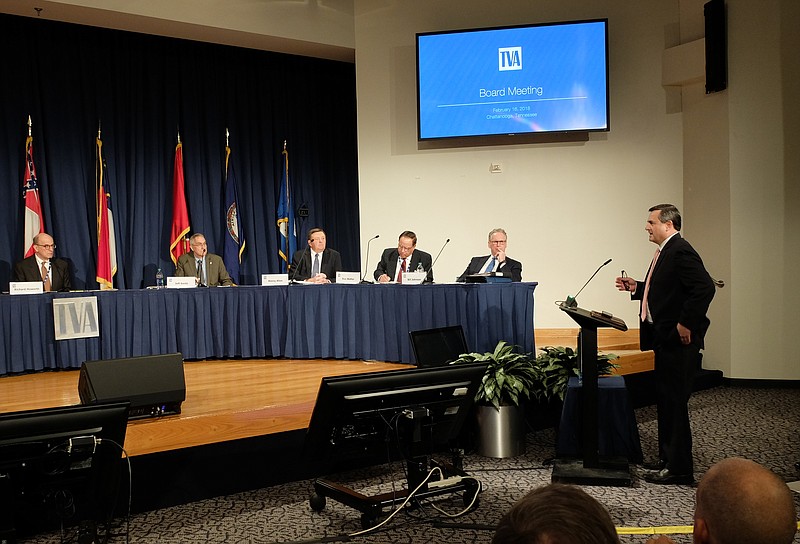Frigid winter temperatures helped to more than double the cold cash earned by the Tennessee Valley Authority in the first three months of 2018 even though the price of power was cheaper than a year ago.
TVA said its sales of electricity in the first quarter of calendar 2018 were up 9 percent over a year ago due to a colder-than-normal weather, which pushed up power usage in the majority of homes and businesses that heat their houses and buildings with electricity in TVA's 7-state region. With more plentiful rains boosting hydroelectric generation and cheaper supplies of natural gas, TVA's price of power still fell by a tenth of a penny from 6.9 cents per kilowatthour a year ago to 6.8 cents per kilowatthour this year.
TVA President Bill Johnson said the completion of new natural gas plants and another nuclear reactor in the past couple of years, combined with more than $600 million of annual expense cuts and extra rainfall from Mother Nature, have positioned TVA to both boost earnings and cut its monthly fuel cost adjustment.
TVA said Friday its net income in the first three months of the year totaled $462 million on sales of $2.75 billion. At the current pace of earnings, TVA could top the record high $1.2 billion earned in fiscal 2016.
"Power demand has been higher so far in 2018 compared to last year's record warm winter, but our customers are paying less (per kilowatthour)," Johnson said. "Higher output from hydro, nuclear and natural gas-fired generation helped keep the Valley warm during cold weather in January while our diversified fleet kept prices lower for TVA's customers during more moderate temperatures."
Colder-than-normal weather during January of this year led to TVA to set an all-time record for energy demand in a 24-hour period, delivering 706 million kilowatt-hours of energy to the Tennessee Valley. TVA also set three of its top-12 winter peak demand records in January when sub freezing temperatures pushed up use of electric heaters and furnaces.
But even with a strong bottom line, TVA directors are preparing to vote next week to create a wholesale grid access charge for the first time for the 154 municipalities and power coops that distribute TVA-generated power to more than 9 people across seven states. Although the grid access charge will be offset by lower rates for each unit of electricity sold by TVA, the proposal has generated hundreds of comments to TVA and has been opposed by consumer and environmental groups. The local power companies that distribute TVA power also have urged TVA to consider amending its requirement for such municipalities and coops to buy all of their power from TVA as part of the rate realignment.
Johnson said the rate changes will be revenue neutral for TVA by offsetting any additional revenues from the new base fee with lower energy charges per kilowatthour sold.
"We've incorporated customer feedback in our final proposal that will be presented to the TVA board, and local power companies that sell power from TVA are expected to see minimal impacts," Johnson said.
TVA, which claims 70 percent of its costs are fixed due to the high capital investment needed to be able to generate and distribute power to 9 million persons in the region, considered adding grid access fees of up to 2.5 cents per kilowatthour. Johnson declined to discuss what the board will consider when it meets next Thursday in Muscle Shoals, Ala.. But TVA appears to be ready to propose at least a half cent-per-kilowatthour grid access charge at the wholesale level.
Such a change will likely lead to higher fixed fees, and lower variable rates, for electricity in the future. Consumer groups such as the NAACP complain that lower income energy users could be harder hit, while environmental groups worry that a grid access fee will limit some of the price advantage for self-generated, supplemental renewable power from solar panels or wind mills at homes and businesses.
"This is contrary to the mission of TVA, which was formed to help the people of this region, not just big industry," said Stephen Smith, president of the Southern Alliance for Clean Energy, which plans to rally against the grid access fee proposal next week.
Contact Dave Flessner at dflessner@timesfreepress.com or at 757-6340.
